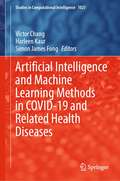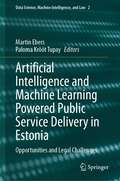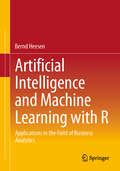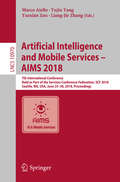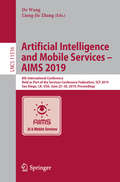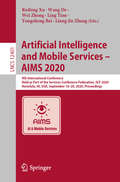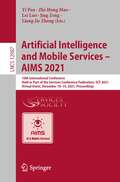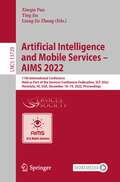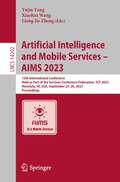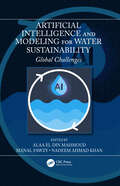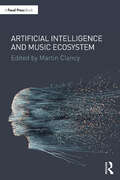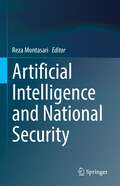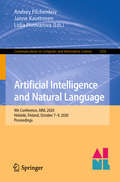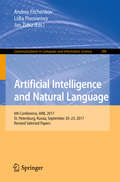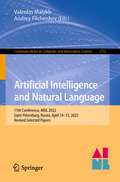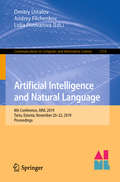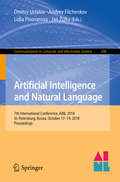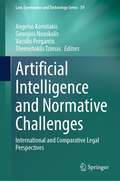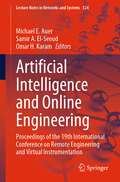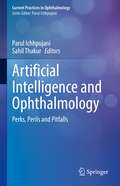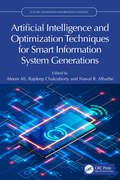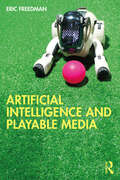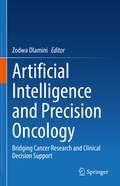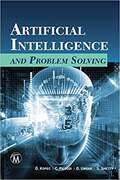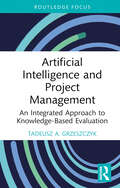- Table View
- List View
Artificial Intelligence and Machine Learning Methods in COVID-19 and Related Health Diseases (Studies in Computational Intelligence #1023)
by Victor Chang Harleen Kaur Simon James FongThis Springer book provides a perfect platform to submit chapters that discuss the prospective developments and innovative ideas in artificial intelligence and machine learning techniques in the diagnosis of COVID-19. COVID-19 is a huge challenge to humanity and the medical sciences. So far as of today, we have been unable to find a medical solution (Vaccine). However, globally, we are still managing the use of technology for our work, communications, analytics, and predictions with the use of advancement in data science, communication technologies (5G & Internet), and AI. Therefore, we might be able to continue and live safely with the use of research in advancements in data science, AI, machine learning, mobile apps, etc., until we can find a medical solution such as a vaccine. We have selected eleven chapters after the vigorous review process. Each chapter has demonstrated the research contributions and research novelty. Each group of authors must fulfill strict requirements.
Artificial Intelligence and Machine Learning Powered Public Service Delivery in Estonia: Opportunities and Legal Challenges (Data Science, Machine Intelligence, and Law #2)
by Martin Ebers Paloma Krõõt TupayThis book gives a comprehensive overview of the state of Artificial Intelligence (AI), especially machine learning (ML) applications in public service delivery in Estonia, discussing the manifold ethical and legal issues that arise under both European and Estonian law. Final conclusions and recommendations set out and analyze various policy options for the public sector, taking into account recent developments at the European level – such as the AIA proposal – as well as the experience of countries that have issued principles and guidelines or even laws for the use of ML in the public sector. “For two reasons, this study is relevant not only for an audience which is interested in Estonian administrative law. First, the authors base their legal analysis primarily on EU law and provide a state of the art-analysis of the relevant secondary legislation. This makes the book a reference text for the European debate on public sector AI governance. Second, this study is part of a larger research project in which four specific use cases of public sector AI have been developed and tested. The practical insights gained in these projects have provided the authors with an excellent understanding of the opportunities and risks of the technology, which distinguishes this legal analysis from similar enterprises.” Excerpt from the foreword by Professor Thomas Wischmeyer (University of Bielefeld)
Artificial Intelligence and Machine Learning with R: Applications in the Field of Business Analytics
by Bernd HeesenIn a VUCA world, which is becoming increasingly volatile, uncertain, and complex, companies, organizations, and states must respond promptly and adequately to the respective situations. Making decisions based on past experiences is less successful in these times than having an accurate understanding of current conditions. The importance of empirical sciences, continuous environmental observation, timely analysis of causal relationships, and deriving new insights from them is increasing. From this, it can be deduced which measures are likely to achieve one's goals with predictable probability, such as which price for an offer generates the desired demand or which marketing measure reaches the desired target group. Where classical statistics were once used for calculations and predictions, today free (open source) tools like R allow data in various formats and from any number of sources to be read in, processed, and analyzed using methods of Artificial Intelligence and Machine Learning. The results can then be perfectly visualized so that decision-makers can benefit quickly and effectively. The age of Data Science has arrived. Digitalization is more than a buzzword or a promise; it is actionable and usable for everyone. This book teaches you, based on the latest version of R at the time of publication, how to use Artificial Intelligence and Machine Learning in Industry 4.0.
Artificial Intelligence and Mobile Services – AIMS 2018: 7th International Conference, Held as Part of the Services Conference Federation, SCF 2018, Seattle, WA, USA, June 25-30, 2018, Proceedings (Lecture Notes in Computer Science #10970)
by Liang-Jie Zhang Yuexian Zou Yujiu Yang Marco AielloThis book constitutes the proceedings of the International Conference on Artificial Intelligence and Mobile Services, AIMS 2018, held as part of SCF 2018, in Seattle, WA, USA, in June 2018. The 20 papers presented in this volume were carefully reviewed and selected from numerous submissions. The papers cover different aspects of mobile services from business management to computing systems, algorithms and applications. They promote technological technological innovations in research and development of mobile services, including, but not limited to, wireless and sensor networks, mobile and wearable computing, mobile enterprise and eCommerce, ubiquitous collaborative and social services, machine-to-machine and Internet-of-things, clouds, cyber-physical integration, and big data analytics for mobility-enabled services
Artificial Intelligence and Mobile Services – AIMS 2019: 8th International Conference, Held as Part of the Services Conference Federation, SCF 2019, San Diego, CA, USA, June 25–30, 2019, Proceedings (Lecture Notes in Computer Science #11516)
by De Wang Liang-Jie ZhangThis book constitutes the proceedings of the 8th International Conference on Artificial Intelligence and Mobile Services, AIMS 2019, held as part of SCF 2019, in San Diego, CA, USA, in June 2019. The 12 full papers and one short paper presented were carefully reviewed and selected from 29 submissions. The papers cover different aspects of mobile services from business management to computing systems, algorithms and applications. They promote technological technological innovations in research and development of mobile services, including, but not limited to, wireless and sensor networks, mobile and wearable computing, mobile enterprise and eCommerce, ubiquitous collaborative and social services, machine-to-machine and Internet-of-things, clouds, cyber-physical integration, and big data analytics for mobility-enabled services.
Artificial Intelligence and Mobile Services – AIMS 2020: 9th International Conference, Held as Part of the Services Conference Federation, SCF 2020, Honolulu, HI, USA, September 18-20, 2020, Proceedings (Lecture Notes in Computer Science #12401)
by Ruifeng Xu Wang De Wei Zhong Ling Tian Yongsheng Bai Liang-Jie ZhangThis book constitutes the proceedings of the 9th International Conference on Artificial Intelligence and Mobile Services, AIMS 2020, held as part of SCF 2020, during September 18-20, 2020. The conference was planned to take place in Honolulu, HI, USA and was changed to a virtual format due to the COVID-19 pandemic. The 11 full and 2 short papers presented were carefully reviewed and selected from 42 submissions. They cover topics in AI Modeling, AI Analysis, AI and Mobile Applications, AI Architecture, AI Management, AI Engineering, Mobile backend as a service (MBaaS), User experience of AI and mobile services.
Artificial Intelligence and Mobile Services – AIMS 2021: 10th International Conference, Held as Part of the Services Conference Federation, SCF 2021, Virtual Event, December 10–14, 2021, Proceedings (Lecture Notes in Computer Science #12987)
by Yi Pan Zhi-Hong Mao Lei Luo Jing Zeng Liang-Jie ZhangThis book constitutes the proceedings of the 10th International Conference on Artificial Intelligence and Mobile Services, AIMS 2021, held as a virtual conference as part of SCF 2021, during December 10-14, 2021.The 9 full presented were carefully reviewed and selected from 20 submissions. They cover topics in AI Modeling, AI Analysis, AI and Mobile Applications, AI Architecture, AI Management, AI Engineering, mobile backend as a service (MBaaS), user experience of AI and mobile services.
Artificial Intelligence and Mobile Services – AIMS 2022: 11th International Conference, Held as Part of the Services Conference Federation, SCF 2022, Honolulu, HI, USA, December 10–14, 2022, Proceedings (Lecture Notes in Computer Science #13729)
by Liang-Jie Zhang Xiuqin Pan Ting JinThis book constitutes the proceedings of the 11th International Conference on Artificial Intelligence and Mobile Services, AIMS 2022, held as Part of the Services Conference Federation, SCF 2022, held in Honolulu, HI, USA, in December 2022. The 10 full papers presented in this volume were carefully reviewed and selected from 22 submissions.The International Conference on AI & Mobile Services (AIMS 2022) aims at providing an international forum that is dedicated to exploring different aspects of AI (from technologies to approaches and algorithms) and mobile services (from business management to computing systems, algorithms, and applications) to promoting technological innovations in research and development of mobile services, including, but not limited to, wireless & sensor networks, mobile & wearable computing, mobile enterprise & eCommerce, ubiquitous collaborative & social services, machine-to-machine & Internet-of-things clouds, cyber-physical integration, and big data analytics for mobility-enabled services.
Artificial Intelligence and Mobile Services – AIMS 2023: 12th International Conference, Held as Part of the Services Conference Federation, SCF 2023, Honolulu, HI, USA, September 23–26, 2023, Proceedings (Lecture Notes in Computer Science #14202)
by Yujiu Yang Xiaohui Wang Liang-Jie ZhangThis book constitutes the refereed proceedings of the 12th International Conference on Artificial Intelligence and Mobile Services, AIMS 2023, Held as Part of the Services Conference Federation, SCF 2023, Honolulu, HI, USA, September 23–26, 2023.The 9 full papers presented together and selected from 16 submissions. The conference focuses on AI modeling; AI analysis; AI & mobile applications; AI architecture; AI management; AI engineering; mobile backend as a service (MBaaS); and user experience of AI & mobile services.
Artificial Intelligence and Modeling for Water Sustainability: Global Challenges
by Alaa El Din Mahmoud Manal Fawzy Nadeem Ahmad KhanArtificial intelligence and the use of computational methods to extract information from data are providing adequate tools to monitor and predict water pollutants and water quality issues faster and more accurately. Smart sensors and machine learning models help detect and monitor dispersion and leakage of pollutants before they reach groundwater. With contributions from experts in academia and industries, who give a unified treatment of AI methods and their applications in water science, this book help governments, industries, and homeowners not only address water pollution problems more quickly and efficiently, but also gain better insight into the implementation of more effective remedial measures. FEATURES Provides cutting-edge AI applications in water sector. Highlights the environmental models used by experts in different countries. Discusses various types of models using AI and its tools for achieving sustainable development in water and groundwater. Includes case studies and recent research directions for environmental issues in water sector. Addresses future aspects and innovation in AI field related to watersustainability. This book will appeal to scientists, researchers, and undergraduate and graduate students majoring in environmental or computer science and industry professionals in water science and engineering, environmental management, and governmental sectors. It showcases artificial intelligence applications in detecting environmental issues, with an emphasis on the mitigation and conservation of water and underground resources.
Artificial Intelligence and Music Ecosystem
by Martin ClancyArtificial Intelligence and Music Ecosystem highlights the opportunities and rewards associated with the application of AI in the creative arts. Featuring an array of voices, including interviews with Jacques Attali, Holly Herndon and Scott Cohen, this book offers interdisciplinary approaches to pressing ethical and technical questions associated with AI. Considering the perspectives of developers, students and artists, as well as the wider themes of law, ethics and philosophy, Artificial Intelligence and Music Ecosystem is an essential introduction for anyone interested in the impact of AI on music, including those studying and working in the creative arts.
Artificial Intelligence and National Security
by Reza MontasariThis book analyses the implications of the technical, legal, ethical and privacy challenges as well as challenges for human rights and civil liberties regarding Artificial Intelligence (AI) and National Security. It also offers solutions that can be adopted to mitigate or eradicate these challenges wherever possible.As a general-purpose, dual-use technology, AI can be deployed for both good and evil. The use of AI is increasingly becoming of paramount importance to the government’s mission to keep their nations safe. However, the design, development and use of AI for national security poses a wide range of legal, ethical, moral and privacy challenges. This book explores national security uses for Artificial Intelligence (AI) in Western Democracies and its malicious use. This book also investigates the legal, political, ethical, moral, privacy and human rights implications of the national security uses of AI in the aforementioned democracies. It illustrates how AI for national security purposes could threaten most individual fundamental rights, and how the use of AI in digital policing could undermine user human rights and privacy. In relation to its examination of the adversarial uses of AI, this book discusses how certain countries utilise AI to launch disinformation attacks by automating the creation of false or misleading information to subvert public discourse. With regards to the potential of AI for national security purposes, this book investigates how AI could be utilized in content moderation to counter violent extremism on social media platforms. It also discusses the current practices in using AI in managing Big Data Analytics demands. This book provides a reference point for researchers and advanced-level students studying or working in the fields of Cyber Security, Artificial Intelligence, Social Sciences, Network Security as well as Law and Criminology. Professionals working within these related fields and law enforcement employees will also find this book valuable as a reference.
Artificial Intelligence and Natural Language: 9th Conference, AINL 2020, Helsinki, Finland, October 7–9, 2020, Proceedings (Communications in Computer and Information Science #1292)
by Andrey Filchenkov Janne Kauttonen Lidia PivovarovaThis book constitutes the refereed proceedings of the 9th Conference on Artificial Intelligence and Natural Language, AINL 2020, held in Helsinki, Finland, in October 2020. The 11 revised full papers and 3 short papers were carefully reviewed and selected from 36 submissions. Additionally, the volume presents 1 shared task paper. The volume presents recent research in areas of of text mining, speech technologies, dialogue systems, information retrieval, machine learning, articial intelligence, and robotics.
Artificial Intelligence and Natural Language: 6th Conference, Ainl 2017, St. Petersburg, Russia, September 20-23, 2017, Revised Selected Papers (Communications In Computer And Information Science #789)
by Jan Žižka Andrey Filchenkov Lidia PivovarovaThis book constitutes the refereed proceedings of the 6th Conference on Artificial Intelligence and Natural Language, AINL 2017, held in St. Petersburg, Russia, in September 2017. The 13 revised full papers, 4 revised short papers papers were carefully reviewed and selected from 35 submissions. The papers are organized in topical sections on social interaction analysis, speech processing, information extraction, Web-scale data processing, computation morphology and word embedding, machine learning. The volume also contains 6 papers participating in the Russian paraphrase detection shared task.
Artificial Intelligence and Natural Language: 11th Conference, AINL 2022, Saint Petersburg, Russia, April 14–15, 2022, Revised Selected Papers (Communications in Computer and Information Science #1731)
by Valentin Malykh Andrey FilchenkovThis book constitutes the refereed proceedings of the 11th Conference on Artificial Intelligence and Natural Language, AINL 2022, held in St. Petersburg, Russia, in April 2022. The 8 revised full papers and 1 short paper were carefully reviewed and selected from 20 submissions. The volume presents recent research in areas of of text mining, speech technologies, dialogue systems, information retrieval, machine learning, articial intelligence, and robotics.
Artificial Intelligence and Natural Language: 8th Conference, AINL 2019, Tartu, Estonia, November 20–22, 2019, Proceedings (Communications in Computer and Information Science #1119)
by Dmitry Ustalov Andrey Filchenkov Lidia PivovarovaThis book constitutes the refereed proceedings of the 8th Conference on Artificial Intelligence and Natural Language, AINL 2019, held in Tartu, Estonia, in November 2019. The 10 revised full papers and 2 short papers were carefully reviewed and selected from 34 submissions. The papers are organized according to the following topics: data acquisition and annotation; human-computer interaction; statistical natural language processing; neural language models.
Artificial Intelligence and Natural Language: 7th International Conference, AINL 2018, St. Petersburg, Russia, October 17–19, 2018, Proceedings (Communications in Computer and Information Science #930)
by Dmitry Ustalov Andrey Filchenkov Lidia Pivovarova Jan ŽižkaThis book constitutes the refereed proceedings of the 7th Conference on Artificial Intelligence and Natural Language, AINL 2018, held in St. Petersburg, Russia, in October 2018. The 19 revised full papers were carefully reviewed and selected from 56 submissions and cover a wide range of topics, including morphology and word-level semantics, sentence and discourse representations, corpus linguistics, language resources, and social interaction analysis.
Artificial Intelligence and Normative Challenges: International and Comparative Legal Perspectives (Law, Governance and Technology Series #59)
by Angelos Kornilakis Georgios Nouskalis Vassilis Pergantis Themistoklis TzimasArtificial intelligence (AI) – both in its current, comparatively limited form and even more so in its potential future forms (such as general and superintelligence) – has raised both concerns and hopes. Its actual and potential consequences are increasingly far-reaching, affecting almost every facet of human life on a collective and individual level: from the use of mobile phones and social media to autonomous weapons, and from the digitalization of knowledge and information to the patentability of AI innovations, unexpected philosophical, ontological, political and legal questions continue to arise.This book offers an insightful and essential guide to the scientific questions that are shaping humanity’s present and future. Presenting a collection of academic essays written by prominent scholars, it addresses the major legal issues concerning AI: its impact on a wide range of human behavior and the general legal response, including questions on AI and legal personhood; responsibility, liability and culpability in the age of AI; the challenges AI poses for intellectual property regimes; human rights challenges; and AI’s impact on jus ad bellum and jus in bello.Given its scope, the book will appeal to researchers, scholars and practitioners seeking a guide to this rapidly transforming landscape.
Artificial Intelligence and Online Engineering: Proceedings of the 19th International Conference on Remote Engineering and Virtual Instrumentation (Lecture Notes in Networks and Systems #524)
by Michael E. Auer Samir A. El-Seoud Omar H. KaramNowadays, online technologies are the core of most fields of engineering and the whole society and are inseparable connected for example with Internet of Things & Industrial Internet of Things (Industry 4.0), Online & Biomedical Engineering, Data Science, Machine Learning, and Artificial Intelligence, Cross & Mixed Reality, and Remote Working Environments. to name only a few. Since the first REV conference in 2004, we tried to focus on the upcoming use of the Internet for engineering tasks and the opportunities as well as challenges around it. Consequently, the motto of this year’s REV2022 was “Artificial Intelligence and Online Engineering”. In a globally connected world, the interest in online collaboration, teleworking, remote services, and other digital working environments is rapidly increasing. In response to that, the general objective of this conference is to contribute and discuss fundamentals, applications, and experiences in the field of Online and Remote Engineering, Virtual Instrumentation and other related new technologies like Cross Reality, Data Science & Big Data, Internet of Things & Industrial Internet of Things, Industry 4.0, Cyber-Security, and M2M & Smart Objects. Another objective of the conference is to discuss guidelines and new concepts for engineering education in higher and vocational education institutions, including emerging technologies in learning, MOOCs & MOOLs, and Open Resources. REV2022 was the 19th in a series of annual events concerning the area of Online Engineering. It has been organized in cooperation with The British University in Egypt (BUE), Cairo, as a hybrid event from February 28 until March 02, 2022.
Artificial Intelligence and Ophthalmology: Perks, Perils and Pitfalls (Current Practices in Ophthalmology)
by Parul Ichhpujani Sahil ThakurThe book helps to explore the vast expanse of artificial intelligence-based scientific content that has been published in the last few years. Ophthalmology has recently undergone a silent digital revolution, with machine learning and deep learning algorithms consistently outperforming human graders in studies published across the globe. It is high time that a resource that breaks this information behemoth into easily digestible bits comes to the fore. This book simplifies the complex mechanics of algorithms used in ophthalmology and vision science applications. It also tries to address potential ethical issues with machines entering our clinics and patients’ lives. Overall it is essential reading for ophthalmologists/eye care professionals interested in artificial intelligence and everyone who is looking for a deep dive into the exciting world of digital medicine.
Artificial Intelligence and Optimization Techniques for Smart Information System Generations (Future Generation Information Systems)
by Aleem Ali Rajdeep Chakraborty Nawaf R. AlharbeThe text comprehensively focusses on the use of artificial intelligence and optimization techniques for creating smart information systems. Focuses on extracting information from blockchain repository using artificial intelligence and machine learning algorithms Presents deep learning models to identify and locate objects within images and videos, making it possible for machines to perform tasks such as self-driving cars, surveillance, and robotics Discusses artificial intelligence and optimization techniques for geographic information system (GIS) generation such as spatial data processing Covers artificial intelligence algorithms such as dimensionality, distance metrics, clustering, error calculation, hill climbing, and linear regression Illustrates topics such as image recognition, natural language processing, fraud detection, information system security, and intrusion detection system
Artificial Intelligence and Playable Media
by Eric FreedmanThis book introduces readers to artificial intelligence (AI) through the lens of playable media and explores the impact of such software on everyday life. From video games to robotic companions to digital twins, artificial intelligence drives large sectors of the culture industry where play, media and machine learning coexist. This book illustrates how playable media contribute to our sense of self, while also harnessing our data, tightening our bonds with computation and realigning play with the demands of network logic. Author Eric Freedman examines a number of popular media forms - from the Sony AIBO robotic dog, video game developer Naughty Dog’s Uncharted and The Last of Us franchises, to Peloton’s connected fitness equipment - to lay bare the computational processes that undergird playable media, and addresses the social, cultural, technological and economic forces that continue to shape user-centered experience and design. The case studies are drawn from a number of related research fields, including science and technology studies, media studies and software studies. This book is ideal for media studies students, scholars and practitioners interested in understanding how applied artificial intelligence works in popular, public and visual culture.
Artificial Intelligence and Precision Oncology: Bridging Cancer Research and Clinical Decision Support
by Zodwa DlaminiThis book highlights the use of artificial intelligence (AI), big data and precision oncology for medical decision making in cancer screening, diagnosis, prognosis and treatment. Precision oncology has long been thought of as ideal for the management and treatment of cancer. This strategy promises to revolutionize the treatment, control, and prevention of cancer by tailoring tests, treatments and predictions to specific individuals or population groups. In order to accomplish these goals, vast amounts of patient or population group specific data needs to be integrated and analysed to be able to identify key patterns or features which can be used to define or characterize the disease or the response to the disease in these individuals. These patterns or features can be as varied as molecular patterns or features in medical images. This level of data analysis and integration can only be achieved through the use of AI. The book is divided into three parts starting with a section on the use of artificial intelligence for screening, diagnosis and monitoring in precision oncology. The second part: Artificial intelligence and Omics in precision oncology, highlights the use of AI and epigenetics, metabolomics, microbiomics in precision oncology. The third part covers artificial intelligence in cancer therapy and its clinical applications. It also highlights the use of AI tools for risk prediction, early detection, diagnosis and accurate prognosis. This book, written by experts in the field from academia and industry, will appeal to cancer researchers, clinical oncologists, pathologists, medical students, academic teaching staff and medical residents interested in cancer research as well as those specialising as clinical oncologists.
Artificial Intelligence And Problem Solving
by Christopher Pileggi David Ungar Shweta Shetty Danny KopecARTIFICIAL INTELLIGENCE AND PROBLEM SOLVING
Artificial Intelligence and Project Management: An Integrated Approach to Knowledge-Based Evaluation (ISSN)
by Tadeusz A. GrzeszczykAlthough some people had doubts about the usefulness of such solutions in the past, artificial intelligence (AI) plays a growing role in modern business. It can be expected that the interest in it will also lead to an increase in support for the planning, evaluation, and implementation of projects. In particular, the proper functioning of multifaceted evaluation methods has a crucial impact on the appropriate planning and execution of various projects, as well as the effective achievement of the organization’s goals. This book offers a presentation of the complex problems and challenges related to the development of AI in project management, proposes an integrated approach to knowledge-based evaluation, and indicates the possibilities of improving professional practical knowledge in this field.The unique contribution of this book is to draw attention to the possibilities resulting from conducting transdisciplinary research and drawing on the rich achievements in the field of research development on knowledge-based systems that can be used to holistically support the processes of planning, evaluation, and project management. The concept of the integrated approach to knowledge-based evaluation is presented and developed as a result of drawing inspiration mainly from the systems approach, generative AI, and selected mathematical models.Presented in a highly accessible manner, the book discusses mathematical tools in a simple way, which enables understanding of the content by readers across broad subject areas who may be not only participants in specialist training and university students but also practitioners, consultants, or evaluators. This book will be a valuable resource for academics and upper-level students, in particular, across project management-related fields, and of great interest to all those looking to understand the challenges and effectiveness of AI in business.
